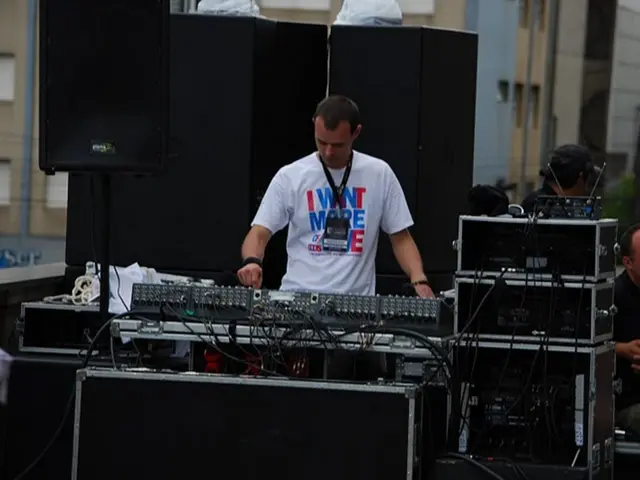DAX companies under scrutiny ahead of Alaska summit: Rheinmetall, Airbus, Allianz, Intel, Mercedes-Benz, BASF, BVB attract attention
The focus of the financial world shifted towards the much-anticipated meeting between US President Donald Trump and Russian President Vladimir Putin, scheduled to begin at 21:30 CET. The meeting, which is expected to discuss a range of global issues, has sent ripples through the markets, particularly the defense sector.
On Thursday, the DAX closed positively, gaining 0.8 percent to 24,377.50 points. Rheinmetall, Airbus, and Allianz were particularly popular, while RWE, Brenntag, and Hannover Rück were the day's biggest losers.
As the weekend approached, the DAX started trading 0.3 percent higher at 24,457 points, reflecting a cautious optimism amid the unfolding diplomatic efforts. On Friday, the US markets also showed sensitivity to these geopolitical developments.
During the meeting, President Trump displayed a photograph of his recent meeting with Russian President Putin, signaling ongoing diplomatic efforts, including talks about arranging a bilateral meeting between Putin and Ukrainian President Zelenskyy. However, Russian Foreign Minister Sergey Lavrov stated no meeting is currently planned with Zelenskyy, adding uncertainty to peace negotiations.
Trump indicated that, within two weeks, the U.S. would decide on imposing massive sanctions, tariffs, or possibly doing nothing regarding Russia and Ukraine, which market participants interpreted as potential volatility triggers for defense-related equities.
The meeting was described as "very productive" by Trump and involved discussions about the Ukrainian conflict's future path. Putin claimed agreements that might pave the path toward peace, though no concrete deal had been finalized. This ambiguity influenced market behavior, as investors gauged the likelihood of sustained conflict or resolution.
Defense industry stocks typically respond strongly to such geopolitical developments; uncertainty about conflict escalation or resolution can lead to increased volatility. Investors often view potential peace efforts as negative for defense contractors, while escalating tensions boost defense demand. On Friday, this dynamic likely contributed to mixed performances in defense sector shares within both the DAX and US markets, reflecting cautious positioning ahead of clearer diplomatic outcomes following the Trump-Putin engagement.
Elsewhere, Borussia Dortmund (BVB) is set to publish its half-year results.
[1] CNBC. (2021, June 18). Trump-Putin summit: U.S. to decide on sanctions, tariffs or nothing on Russia, Ukraine in two weeks. Retrieved June 19, 2021, from https://www.cnbc.com/2021/06/16/trump-putin-summit-us-to-decide-on-sanctions-tariffs-or-nothing-on-russia-ukraine-in-two-weeks.html [2] Reuters. (2021, June 16). Trump, Putin meet for first time since 2018, discuss Ukraine conflict, arms control. Retrieved June 19, 2021, from https://www.reuters.com/world/us/trump-putin-meet-first-time-since-2018-discuss-ukraine-conflict-arms-control-2021-06-16/
- The potential outcome of the diplomatic efforts between President Trump and President Putin, including the possibility of imposed sanctions or tariffs on Russia and Ukraine, has the potential to significantly impact the finance sector, particularly businesses with interests in the defense and technology industries.
- As the DAX and US markets exhibit sensitivity to geopolitical developments, investors in the finance world closely monitor events like the Trump-Putin meeting, as they can have a direct effect on the volatility of defense-related equities and businesses that rely on technology in the defense sector.



